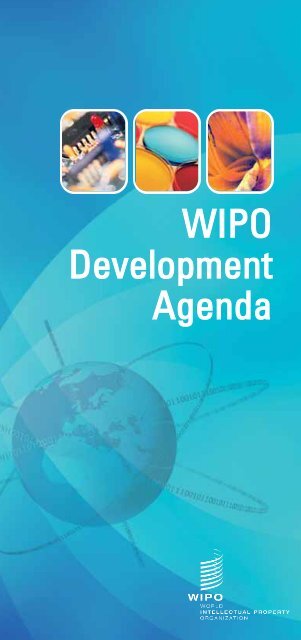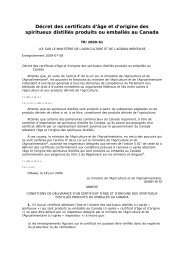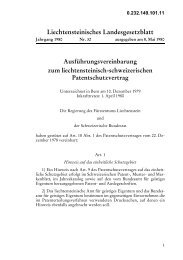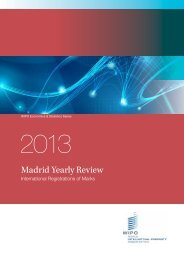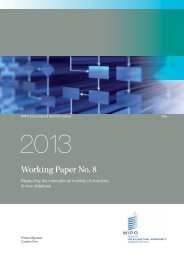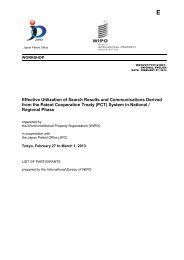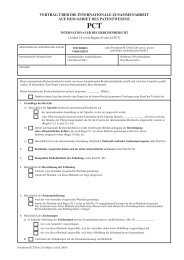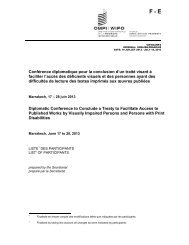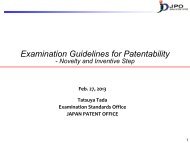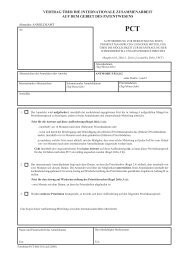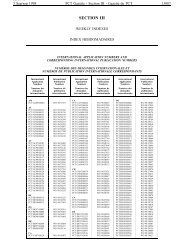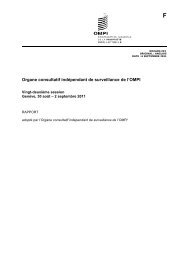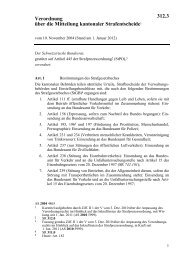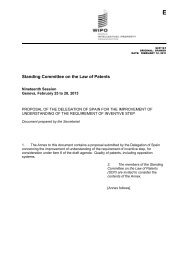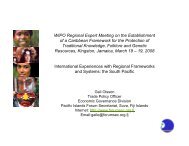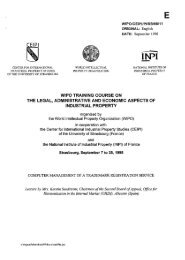WIPO Development Agenda
WIPO Development Agenda
WIPO Development Agenda
Create successful ePaper yourself
Turn your PDF publications into a flip-book with our unique Google optimized e-Paper software.
<strong>WIPO</strong><br />
<strong>Development</strong><br />
<strong>Agenda</strong>
2<br />
The <strong>WIPO</strong> <strong>Development</strong> <strong>Agenda</strong> aims to ensure that<br />
development considerations form an integral part of<br />
<strong>WIPO</strong>’s work. As such, it is a cross-cutting issue<br />
which touches upon all sectors of the Organization.<br />
When formally establishing the <strong>Development</strong><br />
<strong>Agenda</strong> in October 2007, the <strong>WIPO</strong> General<br />
Assembly adopted a set of 45 recommendations to<br />
enhance the development dimension of the<br />
Organization’s activities. The recommendations are<br />
divided into the following six clusters:<br />
Cluster A. Technical Assistance and Capacity<br />
Building<br />
Cluster B. Norm-setting, flexibilities, public policy<br />
and public domain<br />
Cluster C. Technology Transfer, Information and<br />
Communication Technologies (ICT) and Access to<br />
Knowledge<br />
Cluster D. Assessment, Evaluation and Impact<br />
Studies<br />
Cluster E. Institutional Matters including Mandate<br />
and Governance<br />
Cluster F. Other Issues
3<br />
Cluster A. Technical Assistance and<br />
Capacity Building<br />
1 <strong>WIPO</strong> technical assistance shall be, inter alia,<br />
development-oriented, demand-driven and<br />
transparent, taking into account the priorities<br />
and the special needs of developing countries,<br />
especially LDCs, as well as the different levels of<br />
development of Member States and activities<br />
should include time frames for completion. In<br />
this regard, design, delivery mechanisms and<br />
evaluation processes of technical assistance<br />
programs should be country specific.<br />
2 Provide additional assistance to <strong>WIPO</strong> through<br />
donor funding, and establish Trust-Funds or<br />
other voluntary funds within <strong>WIPO</strong> specifically<br />
for LDCs, while continuing to accord high<br />
priority to finance activities in Africa through<br />
budgetary and extra-budgetary resources, to<br />
promote, inter alia, the legal, commercial,<br />
cultural, and economic exploitation of<br />
intellectual property in these countries.<br />
3 Increase human and financial allocation for<br />
technical assistance programs in <strong>WIPO</strong> for<br />
promoting a, inter alia, development-oriented<br />
intellectual property culture, with an emphasis<br />
on introducing intellectual property at different<br />
academic levels and on generating greater<br />
public awareness on intellectual property.<br />
4 Place particular emphasis on the needs of small<br />
and medium-sized enterprises (SMEs) and<br />
institutions dealing with scientific research and<br />
cultural industries and assist Member States, at<br />
their request, in setting-up appropriate national<br />
strategies in the field of intellectual property.
4<br />
5 <strong>WIPO</strong> shall display general information on all<br />
technical assistance activities on its website,<br />
and shall provide, on request from Member<br />
States, details of specific activities, with the<br />
consent of the Member State(s) and other<br />
recipients concerned, for which the activity was<br />
implemented.<br />
6 <strong>WIPO</strong>’s technical assistance staff and<br />
consultants shall continue to be neutral and<br />
accountable, by paying particular attention to<br />
the existing Code of Ethics, and by avoiding<br />
potential conflicts of interest. <strong>WIPO</strong> shall draw<br />
up and make widely known to the Member<br />
States a roster of consultants for technical<br />
assistance available with <strong>WIPO</strong>.<br />
7 Promote measures that will help countries deal<br />
with intellectual property-related anticompetitive<br />
practices, by providing technical<br />
cooperation to developing countries, especially<br />
LDCs, at their request, in order to better<br />
understand the interface between IPRs and<br />
competition policies.<br />
8 Request <strong>WIPO</strong> to develop agreements with<br />
research institutions and with private<br />
enterprises with a view to facilitating the<br />
national offices of developing countries,<br />
especially LDCs, as well as their regional and<br />
sub-regional intellectual property organizations<br />
to access specialized databases for the<br />
purposes of patent searches.<br />
9 Request <strong>WIPO</strong> to create, in coordination with<br />
Member States, a database to match specific<br />
intellectual property -related development<br />
needs with available resources, thereby<br />
expanding the scope of its technical assistance<br />
programs, aimed at bridging the digital divide.
5<br />
10 To assist Member States to develop and<br />
improve national intellectual property<br />
institutional capacity through further<br />
development of infrastructure and other<br />
facilities with a view to making national<br />
intellectual property institutions more efficient<br />
and promote fair balance between intellectual<br />
property protection and the public interest. This<br />
technical assistance should also be extended to<br />
sub-regional and regional organizations dealing<br />
with intellectual property.<br />
11 To assist Member States to strengthen national<br />
capacity for protection of domestic creations,<br />
innovations and inventions and to support<br />
development of national scientific and<br />
technological infrastructure, where appropriate,<br />
in accordance with <strong>WIPO</strong>’s mandate.<br />
12 To further mainstream development<br />
considerations into <strong>WIPO</strong>’s substantive and<br />
technical assistance activities and debates, in<br />
accordance with its mandate.<br />
13 <strong>WIPO</strong>’s legislative assistance shall be, inter alia,<br />
development-oriented and demand-driven,<br />
taking into account the priorities and the<br />
special needs of developing countries,<br />
especially LDCs, as well as the different levels of<br />
development of Member States and activities<br />
should include time frames for completion.<br />
14 Within the framework of the agreement<br />
between <strong>WIPO</strong> and the WTO, <strong>WIPO</strong> shall make<br />
available advice to developing countries and<br />
LDCs, on the implementation and operation of<br />
the rights and obligations and the<br />
understanding and use of flexibilities contained<br />
in the TRIPS Agreement.
6<br />
Cluster B. Norm-Setting, Flexibilities,<br />
Public Policy and Public Domain<br />
15 Norm-setting activities shall:<br />
• be inclusive and member-driven;<br />
• take into account different levels of<br />
development;<br />
• take into consideration a balance between<br />
costs and benefits;<br />
• be a participatory process, which takes into<br />
consideration the interests and priorities of all<br />
<strong>WIPO</strong> Member States and the viewpoints of<br />
other stakeholders, including accredited intergovernmental<br />
organizations (IGOs) and NGOs;<br />
and<br />
• be in line with the principle of neutrality<br />
of the <strong>WIPO</strong> Secretariat.<br />
16 Consider the preservation of the public domain<br />
within <strong>WIPO</strong>’s normative processes and deepen<br />
the analysis of the implications and benefits of<br />
a rich and accessible public domain.<br />
17 In its activities, including norm-setting, <strong>WIPO</strong><br />
should take into account the flexibilities in<br />
international intellectual property agreements,<br />
especially those which are of interest to<br />
developing countries and LDCs.<br />
18 To urge the IGC to accelerate the process on<br />
the protection of genetic resources, traditional<br />
knowledge and folklore, without prejudice to any<br />
outcome, including the possible development<br />
of an international instrument or instruments.<br />
19 To initiate discussions on how, within <strong>WIPO</strong>’s<br />
mandate, to further facilitate access to<br />
knowledge and technology for developing<br />
countries and LDCs to foster creativity and<br />
innovation and to strengthen such existing<br />
activities within <strong>WIPO</strong>.
7<br />
20 To promote norm-setting activities related to IP<br />
that support a robust public domain in <strong>WIPO</strong>’s<br />
Member States, including the possibility of<br />
preparing guidelines which could assist<br />
interested Member States in identifying subject<br />
matters that have fallen into the public domain<br />
within their respective jurisdictions.<br />
21 <strong>WIPO</strong> shall conduct informal, open and<br />
balanced consultations, as appropriate, prior to<br />
any new norm-setting activities, through a<br />
member-driven process, promoting the<br />
participation of experts from Member States,<br />
particularly developing countries and LDCs.<br />
22 <strong>WIPO</strong>’s norm-setting activities should be<br />
supportive of the development goals agreed<br />
within the United Nations system, including<br />
those contained in the Millennium Declaration.<br />
The <strong>WIPO</strong> Secretariat, without prejudice to the<br />
outcome of Member States considerations,<br />
should address in its working documents for<br />
norm-setting activities, as appropriate and as<br />
directed by Member States, issues such as: (a)<br />
safeguarding national implementation of<br />
intellectual property rules (b) links between<br />
intellectual property and competition (c)<br />
intellectual property -related transfer of<br />
technology (d) potential flexibilities, exceptions<br />
and limitations for Member States and (e) the<br />
possibility of additional special provisions for<br />
developing countries and LDCs.<br />
23 To consider how to better promote procompetitive<br />
intellectual property licensing<br />
practices, particularly with a view to fostering<br />
creativity, innovation and the transfer and<br />
dissemination of technology to interested<br />
countries, in particular developing countries<br />
and LDCs.
8<br />
Cluster C. Technology Transfer, Information<br />
and Communication Technologies (ICT) and<br />
Access to Knowledge<br />
24 To request <strong>WIPO</strong>, within its mandate, to expand<br />
the scope of its activities aimed at bridging the<br />
digital divide, in accordance with the outcomes<br />
of the World Summit on the Information<br />
Society (WSIS) also taking into account the<br />
significance of the Digital Solidarity Fund (DSF).<br />
25 To explore intellectual property -related policies<br />
and initiatives necessary to promote the<br />
transfer and dissemination of technology, to<br />
the benefit of developing countries and to take<br />
appropriate measures to enable developing<br />
countries to fully understand and benefit from<br />
different provisions, pertaining to flexibilities<br />
provided for in international agreements, as<br />
appropriate.<br />
26 To encourage Member States, especially<br />
developed countries, to urge their research and<br />
scientific institutions to enhance cooperation<br />
and exchange with research and development<br />
institutions in developing countries, especially<br />
LDCs.<br />
27 Facilitating intellectual property -related aspects<br />
of ICT for growth and development: Provide<br />
for, in an appropriate <strong>WIPO</strong> body, discussions<br />
focused on the importance of intellectual<br />
property -related aspects of ICT, and its role in<br />
economic and cultural development, with<br />
specific attention focused on assisting Member<br />
States to identify practical intellectual property -<br />
related strategies to use ICT for economic,<br />
social and cultural development.
9<br />
28 To explore supportive intellectual property -<br />
related policies and measures Member States,<br />
especially developed countries, could adopt for<br />
promoting transfer and dissemination of<br />
technology to developing countries.<br />
29 To include discussions on intellectual property -<br />
related technology transfer issues within the<br />
mandate of an appropriate <strong>WIPO</strong> body.<br />
30 <strong>WIPO</strong> should cooperate with other IGOs to<br />
provide to developing countries, including<br />
LDCs, upon request, advice on how to gain<br />
access to and make use of intellectual propertyrelated<br />
information on technology, particularly<br />
in areas of special interest to the requesting<br />
parties.<br />
31 To undertake initiatives agreed by Member<br />
States, which contribute to transfer of<br />
technology to developing countries, such as<br />
requesting <strong>WIPO</strong> to facilitate better access to<br />
publicly available patent information.<br />
32 To have within <strong>WIPO</strong> opportunity for exchange<br />
of national and regional experiences and<br />
information on the links between IPRs and<br />
competition policies.
10<br />
Cluster D. Assessment, Evaluation and<br />
Impact Studies<br />
33 To request <strong>WIPO</strong> to develop an effective yearly<br />
review and evaluation mechanism for the<br />
assessment of all its development-oriented<br />
activities, including those related to technical<br />
assistance, establishing for that purpose specific<br />
indicators and benchmarks, where appropriate.<br />
34 With a view to assisting Member States in<br />
creating substantial national programs, to<br />
request <strong>WIPO</strong> to conduct a study on constraints<br />
to intellectual property protection in the<br />
informal economy, including the tangible costs<br />
and benefits of intellectual property protection<br />
in particular in relation to generation of<br />
employment.<br />
35 To request <strong>WIPO</strong> to undertake, upon request of<br />
Member States, new studies to assess the<br />
economic, social and cultural impact of the use<br />
of intellectual property systems in these States.<br />
36 To exchange experiences on open collaborative<br />
projects such as the Human Genome Project as<br />
well as on intellectual property models.<br />
37 Upon request and as directed by Member<br />
States, <strong>WIPO</strong> may conduct studies on the<br />
protection of intellectual property, to identify<br />
the possible links and impacts between<br />
intellectual property and development.<br />
38 To strengthen <strong>WIPO</strong>’s capacity to perform<br />
objective assessments of the impact of the<br />
organization’s activities on development.
11<br />
Cluster E. Institutional Matters including<br />
Mandate and Governance<br />
39 To request <strong>WIPO</strong>, within its core competence<br />
and mission, to assist developing countries,<br />
especially African countries, in cooperation with<br />
relevant international organizations, by<br />
conducting studies on brain drain and make<br />
recommendations accordingly.<br />
40 To request <strong>WIPO</strong> to intensify its cooperation on<br />
IP related issues with United Nations agencies,<br />
according to Member States’ orientation, in<br />
particular UNCTAD, UNEP, WHO, UNIDO,<br />
UNESCO and other relevant international<br />
organizations, especially the WTO in order to<br />
strengthen the coordination for maximum<br />
efficiency in undertaking development<br />
programs.<br />
41 To conduct a review of current <strong>WIPO</strong> technical<br />
assistance activities in the area of cooperation<br />
and development.<br />
42 To enhance measures that ensure wide<br />
participation of civil society at large in <strong>WIPO</strong><br />
activities in accordance with its criteria<br />
regarding NGO acceptance and accreditation,<br />
keeping the issue under review.<br />
43 To consider how to improve <strong>WIPO</strong>’s role in<br />
finding partners to fund and execute projects<br />
for intellectual property -related assistance in a<br />
transparent and member-driven process and<br />
without prejudice to ongoing <strong>WIPO</strong> activities.<br />
44 In accordance with <strong>WIPO</strong>’s member-driven<br />
nature as a United Nations Specialized Agency,<br />
formal and informal meetings or consultations<br />
relating to norm-setting activities in <strong>WIPO</strong>,
12<br />
organized by the Secretariat, upon request of<br />
the Member States, should be held primarily in<br />
Geneva, in a manner open and transparent to<br />
all Members. Where such meetings are to take<br />
place outside of Geneva, Member States shall<br />
be informed through official channels, well in<br />
advance, and consulted on the draft agenda<br />
and program.<br />
Cluster F. Other Issues<br />
45 To approach intellectual property enforcement<br />
in the context of broader societal interests and<br />
especially development-oriented concerns, with<br />
a view that “the protection and enforcement of<br />
intellectual property rights should contribute to<br />
the promotion of technological innovation and<br />
to the transfer and dissemination of<br />
technology, to the mutual advantage of<br />
producers and users of technological<br />
knowledge and in a manner conducive to social<br />
and economic welfare, and to a balance of<br />
rights and obligations”, in accordance with<br />
Article 7 of the TRIPS Agreement.<br />
World Intellectual Property Organization<br />
Address:<br />
34, chemin des Colombettes<br />
P.O. Box 18<br />
CH-1211 Geneva 20<br />
Switzerland<br />
Telephone: +41 22 338 91 11<br />
Fax: +41 22 733 54 28<br />
Website: www.wipo.int<br />
<strong>WIPO</strong> Publication No. L1015/E ISBN 978-92-805-1878-8


